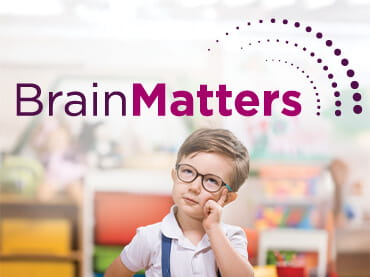- Find a Provider
- Locations
-
Services
- Specialties and Services
- See All Services
Specialties and ServicesBehavioral Health Care Coordination Check In Faster COVID-19 Vaccine Dermatology Driver’s Physical Express Care Flu Vaccine Services Fluoride VarnishLactation Consulting Newborn Care Nutrition Services Online Scheduling Patient Portals Primary Care Medical Home ImPACT® Testing ResearchSame-day Sick Appointments Sports Physicals Substance Use Education Teen Resources Transition to Adulthood Video Visits Walk-in Services Weight Management - Health Resources
-
About Us
- About UPMC CCP
- Patient Resources
About UPMC Children's Community Pediatrics
When Nerves Hit the Stomach: Understanding the Brain-Gut Connection
Your child is about to give a presentation, step onto the soccer field, or walk into a new classroom — and suddenly, their stomach starts to hurt. Sometimes they even feel nauseous. You might wonder: Is this just in their head?
The answer is both yes and no.
The Brain–Gut Connection
The brain and the digestive system are linked through a network of nerves and chemical signals called the gut–brain axis. In fact, your gut is often called the “second brain” because it’s home to millions of nerve cells that communicate directly with the brain.
When a child feels anxious or stressed, the brain sends signals that can cause real, physical symptoms in the stomach and intestines — such as:
- Stomachaches or cramps.
- Nausea.
- Changes in appetite.
- Urgent trips to the bathroom.
This is why feelings of worry or excitement often show up in the gut.
Why It Happens in Kids
Children’s brains — especially the areas that manage emotions — are still developing. They may not have the tools yet to fully manage stress, so it shows up in the body. School transitions, social pressures, or performance situations can all trigger a nervous stomach.
How to Help Your Child Cope
- Acknowledge their feelings. Let them know you believe their discomfort is real. Avoid saying “it’s all in your head.”
- Practice calming strategies. Deep breathing, visualization, and muscle relaxation can help quiet the brain–gut response.
- Keep a routine. Regular sleep, meals, and activity can make the body more resilient to stress.
- Talk it through. Help them identify what’s causing their worry and work together on a plan.
- Know when to seek help. If stomach pain is frequent, intense, or affecting daily life, talk to your pediatrician to rule out medical issues and address anxiety.
The gut and brain are in constant conversation — and in kids, big emotions often speak through the stomach. By supporting both their emotional and physical health, you can help your child manage stress and build resilience for life.
Guidance for Growing Minds
At UPMC Children’s Community Pediatrics, we’re passionate about helping families understand the incredible journey of brain development. That’s why we created Brain Matters—a program offering expert guidance, parenting resources, and tools to support your child’s brain health from infancy through the teen years.
Explore Brain Matters today.





